| Reviews & Columns |
|
Reviews DVD TV on DVD Blu-ray 4K UHD International DVDs In Theaters Reviews by Studio Video Games Features Collector Series DVDs Easter Egg Database Interviews DVD Talk Radio Feature Articles Columns Anime Talk DVD Savant Horror DVDs The M.O.D. Squad Art House HD Talk Silent DVD
|
DVD Talk Forum |
|
|
| Resources |
|
DVD Price Search Customer Service #'s RCE Info Links |
|
Columns
|
|
|
Dr. Quinn, Medicine Woman: The Complete Series Megaset
Created by Beth Sullivan, Dr. Quinn, Medicine Woman premiered in 1993 and went on to run for six seasons, eventually coming off the air in 1998. All told there were 150 episodes of the program and two films that were released after the fact to appease fans still hungry for more. These seasons and films have been released on DVD already, and chances are very good that if you're a Dr. Quinn fan you already have them in your collection.
If you held off, however, A&E has just released a complete series megaset that is definitely an enticing offer. Spread across 42 DVDs, this monstrosity contains all 150 episodes, both made-for-TV films, and bonus material to boot. The collection is presented with an old-world style case and an inner booklet that unfolds like a photo album with all of the DVDs and relevant episode information. It is a unique and attractive piece that stands out and belongs in any fan's collection.
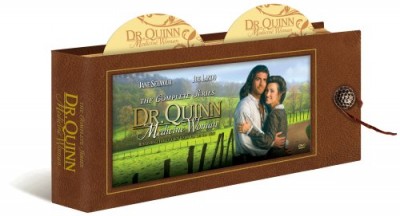
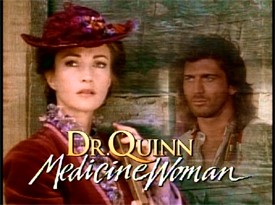 Dr. Quinn, Medicine Woman began in the year 1867. A young female physician from Boston, Massachusetts named Dr. Michaela "Mike" Quinn (Jane Seymour) decides to up and move after the death of her father. Since her father passed away, and the lack of acceptance for women doctors, there is very little business for the family practice in Boston. Luckily she sees a job posting for a position out in Colorado and despite her family's wishes she heads out to the Wild West. Though she knows her stuff and establishes early on that she's as able as or better than any male doctor, the going is tough. At first the townsfolk aren't quite interested in a woman doctor, but through hard work and perseverance she overcomes their irrational fears and begins to build relationships and a business.
Dr. Quinn, Medicine Woman began in the year 1867. A young female physician from Boston, Massachusetts named Dr. Michaela "Mike" Quinn (Jane Seymour) decides to up and move after the death of her father. Since her father passed away, and the lack of acceptance for women doctors, there is very little business for the family practice in Boston. Luckily she sees a job posting for a position out in Colorado and despite her family's wishes she heads out to the Wild West. Though she knows her stuff and establishes early on that she's as able as or better than any male doctor, the going is tough. At first the townsfolk aren't quite interested in a woman doctor, but through hard work and perseverance she overcomes their irrational fears and begins to build relationships and a business.
One of her first patients is a woman named Charlotte, who has befriended Michaela, but is then suddenly bitten by a rattlesnake. On her deathbed she gets Dr. Mike to agree to watch and care for her three children, Matthew (Chad Allen), Colleen (Erika Flores - replaced in the third season by Jessica Bowman), and Brian (Shawn Toovey). Naturally with the building of her practice in the face of mockery, and taking in three kids who are reeling from the death of their mother, things are tough for Michaela. Luckily she meets a man named Bryon Sully (Joe Lando) who is able to see the good in her and allows her to live in his old place. From here on, Dr. Quinn, Medicine Woman follows the adventures of Michaela as she forms a relationship with Sully, becomes a mother to the children, and wins over the townsfolk one by one.
Episodes in the show were mostly standalone by nature, but there are plenty of recurring themes. One of the more common you'll see while watching this show is it's stance on gender equality as Michaela tries to assert herself into the role of town doctor. Other opportunities arise during the series that afford her the chance to assist other women 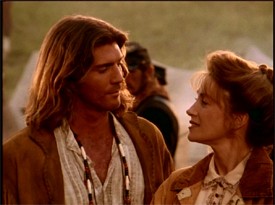 attempting to vie for positions typically held by men. Racism plays an important role too as the town grow to accept the newly freed black slaves that have come to town in the characters of Grace (Jonelle Allen) and Robert E. (Henry Sanders). Other themes the show touches upon include alcoholism, gambling, education, religion, and politics. Each episode attempted to tell a story with a message, and for the most part they worked rather well.
attempting to vie for positions typically held by men. Racism plays an important role too as the town grow to accept the newly freed black slaves that have come to town in the characters of Grace (Jonelle Allen) and Robert E. (Henry Sanders). Other themes the show touches upon include alcoholism, gambling, education, religion, and politics. Each episode attempted to tell a story with a message, and for the most part they worked rather well.
The biggest storylines that run through the program involve developments in relationships between characters. Several of the townsfolk build relationships with each other, and during the course of the program Michaela and Sully tease audiences with their love story as well. Overall, with 150 episodes to play with there are a lot of things that happen, and I don't want to spoil them all for you. Let's just say that by the time the sixth season went off the air, it left a faithful audience frustrated and bewildered. Up to that point the show maintained a decent level of quality, but as a casual viewer it's hard to deny that the latter seasons had begun to slip.
Please note that the season summaries contain spoilers as they progress. These plotlines are crucial to the series and cannot be avoided through discussion of the show.

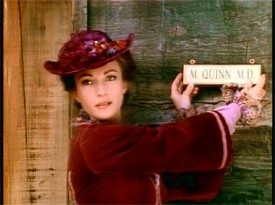 Quite obviously, the first season is where everything is introduced. It was a great opening year with eighteen episodes that helped set the tone for the rest of the series. Basically what you can expect to see with this batch of episodes is Michaela adjusting to her new life. She gets used to being the mother she's been charged to be, attempts to win over the townsfolk, and she and Sully develop a crush on each other. All in all, there's nothing groundbreaking in the first season of the show and quite honestly you're just watching the characters assert themselves into their roles as the writers discover who they are. The season started out slowly, but as it developed things began to gel and the show gained momentum running into its second season.
Quite obviously, the first season is where everything is introduced. It was a great opening year with eighteen episodes that helped set the tone for the rest of the series. Basically what you can expect to see with this batch of episodes is Michaela adjusting to her new life. She gets used to being the mother she's been charged to be, attempts to win over the townsfolk, and she and Sully develop a crush on each other. All in all, there's nothing groundbreaking in the first season of the show and quite honestly you're just watching the characters assert themselves into their roles as the writers discover who they are. The season started out slowly, but as it developed things began to gel and the show gained momentum running into its second season. Of the eighteen episodes there are quite a few notable ones for reasons of story quality, developments in character, and guest appearances. "The Visitor" gets things going early on with a visit by Dr. Mike's mother (the only time the character was portrayed by Jane Wyman) and very early on you see the disparity between the life Michaela had and the one she chose. At first her mother doesn't approve of her new found home, but by the end Michaela wins her over a tad and she even buys a boarding house for Dr. Mike's new clinic. Skipping ahead a little, "Happy Birthday" was another enjoyable episode, which featured Michaela celebrating her 35th birthday. The people of Colorado Springs get together to buy her a sign for the clinic as an official "welcome", the kids try to hook her up with some random guys, and by the end of the episode she and Sully have their first kiss.
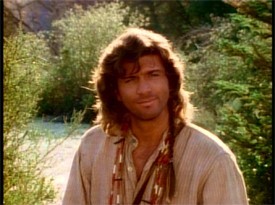 For other good episodes, I felt that "Father's Day" deserves to be mentioned. In this one the scumbag father of the kids Michaela inherits comes to take them away, but after seeing the man he truly is, Dr. Mike isn't about to let that happen. "The Operation" was another strong character building episode as Brian's injures himself falling out of a tree. Dr. Mike is then forced to perform a risky brain surgery on him. Closing out the season was probably my favorite episode, "Portrait". Kenny Rogers appears in this season ender in which he portrays a traveling photographer who is losing his sight. The whole town gets together for a group photo, but a debate springs up about whether or not to allow blacks and Native Americans in with them.
For other good episodes, I felt that "Father's Day" deserves to be mentioned. In this one the scumbag father of the kids Michaela inherits comes to take them away, but after seeing the man he truly is, Dr. Mike isn't about to let that happen. "The Operation" was another strong character building episode as Brian's injures himself falling out of a tree. Dr. Mike is then forced to perform a risky brain surgery on him. Closing out the season was probably my favorite episode, "Portrait". Kenny Rogers appears in this season ender in which he portrays a traveling photographer who is losing his sight. The whole town gets together for a group photo, but a debate springs up about whether or not to allow blacks and Native Americans in with them.
Throughout all of its eighteen episodes there really weren't many flops in the bunch. For the most part each episode featured solid character building drama with well written scripts and finely acted moments. It's easy to see after this first season why the show went on to be such a success. While it definitely had a demographic it was shooting for, there's no denying its widespread appeal. This is solid family entertainment with educable moments, strongly forged relationships, and morals.

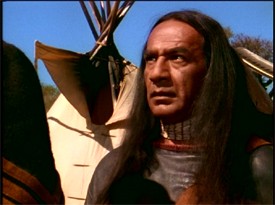 For the second season the show was off to a running start and twenty-seven episodes were lined up for production. Breaking the mold a tad, the show pieced together three two-part episodes to expand upon an individual story and get out of the episodic rut. In this season a new addition comes in the form of Dorothy (Barbara Babcock), who happens to be the sister-in-law of Loren the storekeeper (Orson Bean). She's an important addition to the secondary cast of characters and she becomes a good friend to Dr. Mike. Speaking of the good doctor, she continues to live her life in Colorado Springs and her relationship with Sully takes some interesting turns in this season as well.
For the second season the show was off to a running start and twenty-seven episodes were lined up for production. Breaking the mold a tad, the show pieced together three two-part episodes to expand upon an individual story and get out of the episodic rut. In this season a new addition comes in the form of Dorothy (Barbara Babcock), who happens to be the sister-in-law of Loren the storekeeper (Orson Bean). She's an important addition to the secondary cast of characters and she becomes a good friend to Dr. Mike. Speaking of the good doctor, she continues to live her life in Colorado Springs and her relationship with Sully takes some interesting turns in this season as well. The first and most notable storyline from this season comes in the form of the two-part, "Where the Heart Is". These episodes bring Michaela the bad news that her mother is ill in Boston, so it's up to her to head back home and see what she can do. She packs up her things and brings the kids with her, but leaves Sully behind. While in Boston she helps nurse her mother back to health and begins seeing a fellow doctor who has been assisting her with the treatments. After they've been gone a while, Sully gets worried and heads to Boston to see if Michaela and the children are okay. He discovers that she's being courted by a fancy Boston doctor and gets brought to the point where he confesses his love to her. As it turns out it's a mutual feeling, and the episode ends in a very romantic fashion that paves the way for their future relationship.
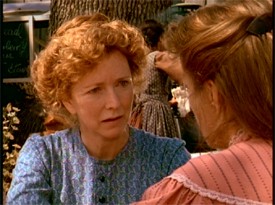 After a smattering of standalone episodes, the next two-parter is another important one with a focus on the tensions between the U.S. Military and a rebel group of Cheyenne. "The Abduction" is much darker than other episodes that came before it, as a group known as Dog Soldiers have begun taking matters into their own hands. They kill U.S. Soldiers and others indiscriminately, and as tensions rise, Dr. Mike gets caught in the middle. She's captured and abused and it's up to Sully to bring her back home before more bloodshed happens. This is a very important and riveting storyline that stands as a prime example of just how good Dr. Quinn could be.
After a smattering of standalone episodes, the next two-parter is another important one with a focus on the tensions between the U.S. Military and a rebel group of Cheyenne. "The Abduction" is much darker than other episodes that came before it, as a group known as Dog Soldiers have begun taking matters into their own hands. They kill U.S. Soldiers and others indiscriminately, and as tensions rise, Dr. Mike gets caught in the middle. She's captured and abused and it's up to Sully to bring her back home before more bloodshed happens. This is a very important and riveting storyline that stands as a prime example of just how good Dr. Quinn could be.
Closing out the season is the final two-part episode, "Return Engagement". In these episodes Sully pops the question to Michaela, but in the meantime there's someone from Michaela's past snooping around town. As it turns out, this newcomer is her long thought to be dead fiancé, who was supposedly killed during the Civil War. Naturally, tensions rise here and this is a storyline that plays more at the heartstrings than other episodes in the season as Dr. Mike is now caught between two men that she loves.
All around the second season here was very good and kept up the quality Dr. Quinn was known for. While I focused mainly on the expanded stories for the purposes of this review, many of the standalone ones from this season were great as well. Johnny and June Cash guest star in "Saving Souls", the gang (and a ghost from the past) get together for the holidays with "Mike's Dream...A Christmas Tale", Sully learns to dance for Michaela in "Best Friends", and more Dog Soldier stuff crops up in "Buffalo Soldiers". Put together, these episodes made for another great season.

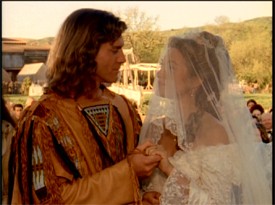 The third season continues to be one collection of highlights after another with many more expanded episodes and season long storylines strewn about. In addition to Michaela and Sully getting closer, Colorado Springs looks forward to the building of a new train station which will connect them to the rest of civilization. The Dog Soldiers also happen to be around as well and the show explores historical events such as the Washita Massacre.
The third season continues to be one collection of highlights after another with many more expanded episodes and season long storylines strewn about. In addition to Michaela and Sully getting closer, Colorado Springs looks forward to the building of a new train station which will connect them to the rest of civilization. The Dog Soldiers also happen to be around as well and the show explores historical events such as the Washita Massacre. "The Train" kicks the season off with the townsfolk petitioning to get a train station approved for their city. While most everyone likes the idea, Sully naturally opposes it. Throughout the season you'll see the train tracks and such being built in the background and it's brought up every now and then. The next big event to happen comes in the form of a two-part episode entitled "The Washington Affair". Here Michaela and Sully head to Washington after the Cheyenne were forced off their land. While there they become involved in a plot to assassinate the President.
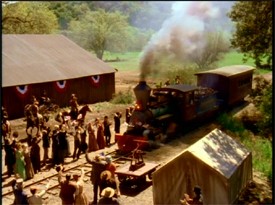 "Ladies Night" is an interesting two-parter that sees Dr. Mike discovering a lump on Dorothy's breast. This prompts a debate between the two about whether or not to perform surgery to remove it. There's also a side story here about Jake dressing in drag and getting kidnapped during Ladies' Night festivities which is pretty funny but of course the main part of the story revolved around Dorothy and it actually netted Babcock a nomination for an Emmy. That's how strong her performance was.
"Ladies Night" is an interesting two-parter that sees Dr. Mike discovering a lump on Dorothy's breast. This prompts a debate between the two about whether or not to perform surgery to remove it. There's also a side story here about Jake dressing in drag and getting kidnapped during Ladies' Night festivities which is pretty funny but of course the main part of the story revolved around Dorothy and it actually netted Babcock a nomination for an Emmy. That's how strong her performance was.
The father of Charlotte's children returns in "Cooper vs. Quinn Parts 1 & 2". This episode was another good one which actually pitted Michaela against him in a custody battle for the kids. A couple of episodes later, and the show moves on to the "Washita" arc, which features the massacre of several main Cheyenne characters. While these episodes are very good and hit quite a few dramatic notes, it's worth mentioning that the presentation of the event is actually historically a few years off. Granted I suppose you're not watching the show for historical accuracy, but it should count for something. A good pair of episodes nonetheless.
The third season of Dr. Quinn, Medicine Woman turned out to be just as strong as the second. The twenty-nine episodes are mostly all of good quality, and the season closes with one of the show's biggest moments, Michaela and Sully's wedding. At this point the series continued to ride its high, and with the fourth season just around the corner, there were certain expectations that were set.

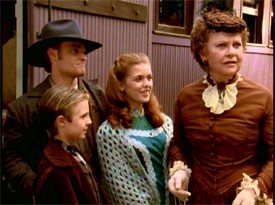 When the fourth season of Dr. Quinn kicked off, the show was arguably at its peak. The main characters got married after a lengthy courting, Michaela had full custody of the kids, business was booming, and much had happened to develop the town prior to this point. One recurring problem with television shows is that for a relationship to work there needs to be a build up to something. Up through the past three seasons that build up was the love between Michaela and Sully. For season four the obvious progression was for the couple to have a child.
When the fourth season of Dr. Quinn kicked off, the show was arguably at its peak. The main characters got married after a lengthy courting, Michaela had full custody of the kids, business was booming, and much had happened to develop the town prior to this point. One recurring problem with television shows is that for a relationship to work there needs to be a build up to something. Up through the past three seasons that build up was the love between Michaela and Sully. For season four the obvious progression was for the couple to have a child. During the beginning of this season the show focuses its attention on Mike and Sully in their new life together. Their feelings are put on display and the children each deal with it in their own way, which plays out in "Mothers and Daughters". After that point there really aren't any significant events pertaining to development of this storyline until the Thanksgiving episode where Michaela discovers that she is indeed with child. From then on the tone of the series changes with the pregnancy playing a big role. One of the biggest things to come from the pregnancy is how it affects Mike's job on a daily basis as she learns to deal with it.
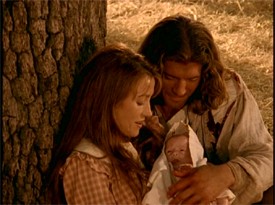 Other noteworthy episodes in this season include "Dead or Alive Parts 1 & 2" which has Sully chasing a mountain man wanted for kidnapping. Another two-part story, "The Expedition Parts", features Michaela and company climbing a mountain. "Hearts and Minds" was a good episode as well with the storyline featuring the Reverend starting a school on an Indian reservation. This was followed by "Reunion", which reunited Michaela with an old friend from college. Also, new this season is the arrival of Boston banker Preston Lodge III intent on opening the first bank and hotel in Colorado Springs and Dr. Andrew Cook who Grandma Quinn brings to town to help deliver Dr. Mike's baby. The whole season ends appropriately with the birth of Katie in "When a Child is Born".
Other noteworthy episodes in this season include "Dead or Alive Parts 1 & 2" which has Sully chasing a mountain man wanted for kidnapping. Another two-part story, "The Expedition Parts", features Michaela and company climbing a mountain. "Hearts and Minds" was a good episode as well with the storyline featuring the Reverend starting a school on an Indian reservation. This was followed by "Reunion", which reunited Michaela with an old friend from college. Also, new this season is the arrival of Boston banker Preston Lodge III intent on opening the first bank and hotel in Colorado Springs and Dr. Andrew Cook who Grandma Quinn brings to town to help deliver Dr. Mike's baby. The whole season ends appropriately with the birth of Katie in "When a Child is Born".
For what it was, the fourth season of Dr. Quinn had plenty of good moments. The writing was still high quality, the acting was still good, and most every episode was entertaining. With that being said, I can't deny that as a whole this season wasn't quite as engaging as the previous ones. With Michaela fully settled down, married to Sully, and with child, the show went in new directions and the spark enjoyed by the three prior years just wasn't there. The tone had changed somewhat, matured, and wasn't quite as welcoming as it was before. Overall the season was still enjoyable, but I can't deny that the show felt like it was declining slightly at this point.

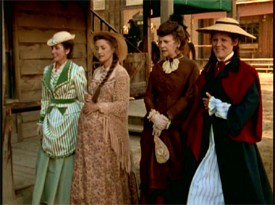 The fifth season of Dr. Quinn, Medicine Woman is probably the weakest we've seen so far. The episodes as a whole just weren't as good, the tone had changed somewhat, and many other things gave rise to a steady decline in quality. With that being said there are still plenty of good episodes here, but it's clear that several of its components just weren't jelling quite as well as they did in the past. Katie has been born, Michaela and Sully are married, and the kids are growing up. Most all of the things that made the earlier seasons so worthwhile have been resolved. At this point the show is simply free to explore other facets of life in Colorado Springs that it didn't before. Not necessarily a bad thing, mind you, but it could have been handled better.
The fifth season of Dr. Quinn, Medicine Woman is probably the weakest we've seen so far. The episodes as a whole just weren't as good, the tone had changed somewhat, and many other things gave rise to a steady decline in quality. With that being said there are still plenty of good episodes here, but it's clear that several of its components just weren't jelling quite as well as they did in the past. Katie has been born, Michaela and Sully are married, and the kids are growing up. Most all of the things that made the earlier seasons so worthwhile have been resolved. At this point the show is simply free to explore other facets of life in Colorado Springs that it didn't before. Not necessarily a bad thing, mind you, but it could have been handled better. The big draw here is the fleshing out of the support cast with episodes where Michaela and Sully more or less play support roles or find that they are caught up in other events. The secondary cast has always been important to the show, but now it felt almost as though the series was relying on them and the town itself. When that isn't going on there's more stuff involving the military and Indians, which takes up most of Sully's time this season. Despite these nitpicks, the fifth season was entertaining enough to get by, but it definitely felt like it had lost some of its focus.
Some of the better episodes from this season include the two-part "Between Friends", where one of Sully's friends shows up to help the family financially, but he winds up falling for Michaela while he's visiting. "A Place to Die" was an important episode as well as it sees something of a major change for Mike and Sully. Something in her clinic is causing her patients to get sick and in order to kill off whatever it is they wind up having to burn all of their possessions. After that Michaela has to work towards restoring the town's faith in her practice. "Having it All" was a good episode that saw Colleen heading off to college, "Separate but Equal" featured Robert E. and Grace's child enrolling in a white school, and "Moment of Truth" had Michaela's sister going off about women's rights and hooking up with Loren.
All in all the fifth season truly wasn't bad, it just wasn't as good as what we've come to expect from the show. It's clear that after the marriage and child the writers kind of backed themselves into a corner and collectively said, "Ok, now what?" There's just a certain lack of focus with this season. It's also worth mentioning that it was unclear whether or not Joe Lando would return for the sixth year, so the show takes steps to decrease his involvement at this point.

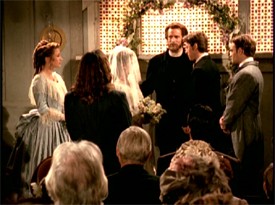 For the sixth season, the trend started by the fifth continues as the episodes just aren't quite as sharp as they could have been. For this season, Sully's character remains in hiding after events in prior episodes so most of the episodes see him only in small parts or having his name mentioned. It's a shame really and it's never really something that fits comfortably in with what we've come to expect. Aside from the storyline involving Sully, Colorado Springs is hit by diphtheria which affects Michaela's family, Robert E. and Grace have some issues with their adopted son Anthony, and in between there are all sorts of standalone episodes that don't really have an effect on each other.
For the sixth season, the trend started by the fifth continues as the episodes just aren't quite as sharp as they could have been. For this season, Sully's character remains in hiding after events in prior episodes so most of the episodes see him only in small parts or having his name mentioned. It's a shame really and it's never really something that fits comfortably in with what we've come to expect. Aside from the storyline involving Sully, Colorado Springs is hit by diphtheria which affects Michaela's family, Robert E. and Grace have some issues with their adopted son Anthony, and in between there are all sorts of standalone episodes that don't really have an effect on each other. Despite the episodic nature of much of this season, there is still a good selection of strong episodes here. "All That Matters" and "A Matter of Conscience" at the beginning of the season have people hunting for Sully as they believe he's still alive. "Lead Me Not" brings Michaela's sister back into the fold just in time for diphtheria to break out in "A Time to Heal Parts 1 & 2" which also features the return of her mother and sister Rebecca to Colorado Springs. "Point Blank" was a fairly strong episode for Michaela that starts when she's shot by a guy who hates doctors. The rest of the episode follows her working through the psychosis of it all.
Aside from these episodes the rest of the final season is full of many ups and downs ending on the rather rushed note of Colleen's marriage to Andrew and a stock market crash causing the loss of the all the money citizens put into the town bank. It really feels like the writers were grasping at straws to come up with some ideas here which is a shame. Dr. Quinn started out very strong and rode a wave of success for a few solid years, but like many other great shows it fizzled out towards the end. This final season is still worth watching, but it's definitely not an example of the show at its best.

With the show cancelled there were many fans who were upset about the way things ended. In an effort to quench their appetites and quiet their cries, CBS released a TV film in 1999. Dr. Quinn, The Movie feels like it was an effort to put a more appropriate close together. Unfortunately the story is kind of a mess and it can be considered little more than an extended episode. The whole plot involves a guy looking to mine for copper in Colorado Springs, but Sully is in a position to turn down the proposition. This prompts the guy to kidnap Katie and run for Mexico, which leads the Quinn gang riding off into the sunset after him. The whole thing felt rushed and forced, so in the end the movie simply doesn't cut it.
Two years later CBS tried yet again to keep Quinn viewers satisfied with another made for TV movie Dr Quinn: The Heart Within. This one featured a story that felt even more like an extended episode of the series than the original "movie" did. The interesting thing is that the entire story takes place in Boston and it never sets foot in Colorado. The film starts on a train and ends on a train. Because of this, the only members of the cast we see are the main players and none of the supporting actors. It feels a little strange and takes something away from the movie, but fortunately the story is decent enough to carry on without them. In this film everyone heads to Boston for Colleen's graduation from Harvard, and while there Michaela's mother becomes ill again. All around the second film was closer to the tone of the series than the first was, and because of that it's a success.
As is the case with most every complete television series on DVD from more than a decade ago, the picture quality here varies throughout each season. The earlier years have a much grainier look with more softness in the image as well as evidence of dirt and scratches. In all honesty every season suffers the same fate, it's just that the later ones are faulted to a lighter degree. Very few moments in the show look as sharp and clean as you'd want them to. I suppose that's to be expected with a series such as this and it's quite evident that A&E didn't do much in the way of picture restoration from the original print. The end result is a series that looks better than it did during broadcast or on those beat up VHS tapes, but it's nothing that's going to knock your socks off.
If you're coming to this review wondering if you should ditch your old A&E collection for this complete series one, don't bother. The transfer for these discs are the exact same as the original ones. More to the point, the discs are coded exactly the same and the only difference is the art on the physical disc itself. Everything right down to the menus and episode selection is the same as the release of the individual seasons. Each DVD even still lists what volume it was from the original release. For example disc 12's menu states that it's volume seven and so on.
Much like the picture quality, the audio for Dr. Quinn, Medicine Woman is presented with 2.0 Dolby Digital stereo. The quality of the sound is about what you'd expect from a show of this vintage with some muted audio and an all around flat presence on the soundstage. For the most part the cleanliness is acceptable and all of the dialogue and music is decent enough. There are some moments in random episodes scattered throughout the series where the sound gets scratchy, but that seems to be a part of the original recordings. A&E probably could have worked around them, but there really wasn't anything done to clean the show up for its presentation on DVD as it is.
Due to the fact that this complete series features a duplicate transfer of the original A&E DVDs, you can expect the same bonus content. The first season offers a fun little inclusion that's a digital tour of Colorado Springs in the 19th Century. You can select different parts of the town and see what prices and such were like back in the 1860's. Aside from that, the first season offers a photo gallery, a list of accolades for the series, and biographies for Joe Lando and Jane Seymour. The most interesting feature for the first season is an episode from A&E's Biography about Jane Seymour. Clocking in at just over 40 minutes, this is a solid look at the life of the woman who made this show what it was.
The second season has it's own bonus features to offer with a commentary by Joe Lando for the episode "Best Friends", some more awards for the series, biographies for most of the cast, and a list of some of the special guest stars for the season. There's also a featurette entitled "Beginnings" (10:48) which assembles most all of the cast to talk about the series, what it was like working on it, and how it changed their lives.
Season three features a commentary with Lando and Seymour for the episode, "For Better or Worse". The fourth season offers another featurette called "Favorites" (10:27) where the cast gets together once again, but this time they discuss their favorite episodes and moments from the series. Skipping ahead to the fifth and sixth seasons there are two more commentary tracks. One for episode "Legend" features Shawn Toovey and Chad Allen, and the other for "Point Blank" offers Seymour and James Keach. Aside from these bonus features for the series there is also a trivia quiz and production stills gallery available for the movies.
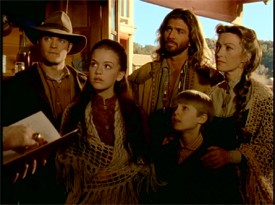 It was an unlikely success early on, but Dr. Quinn quickly became one of the better shows on television during its time. The show enjoyed a few seasons of outstanding quality and though the final two seasons fizzled out a tad, it remained an entertaining series right up to the bitter end. To this day the show maintains a level of popularity and after sitting through the whole franchise it's easy to see why. This was a memorable and touching series with well-developed characters, strong actors, and good writing. That's always a winning combination and because of that, this is a release that any fan of the show should consider.
It was an unlikely success early on, but Dr. Quinn quickly became one of the better shows on television during its time. The show enjoyed a few seasons of outstanding quality and though the final two seasons fizzled out a tad, it remained an entertaining series right up to the bitter end. To this day the show maintains a level of popularity and after sitting through the whole franchise it's easy to see why. This was a memorable and touching series with well-developed characters, strong actors, and good writing. That's always a winning combination and because of that, this is a release that any fan of the show should consider.
With all that being said, I must admit that there's little reason to buy into this massive release if you already own the previous A&E releases. The packaging may be fantastic, but the fact that each disc is a duplicate of the ones already in circulation cheapens it a tad. This is by no means worth a double dip. However, if you have wanted the show and haven't picked it up yet, then consider this an outstanding value. For fans of the show without Dr. Quinn in their collections, this set comes highly recommended.
Check out more of my reviews here. Head on over to my anime blog as well for random musings and reviews of anime, manga, and stuff from Japan!
|
| Popular Reviews |
| Sponsored Links |
|
|
| Sponsored Links |
|
|
| Release List | Reviews | Shop | Newsletter | Forum | DVD Giveaways | Blu-Ray | Advertise |
|
Copyright 2024 DVDTalk.com All Rights Reserved. Legal Info, Privacy Policy, Terms of Use,
Manage Preferences,
Your Privacy Choices | |||||||











